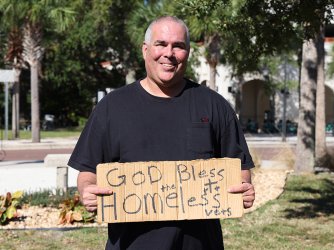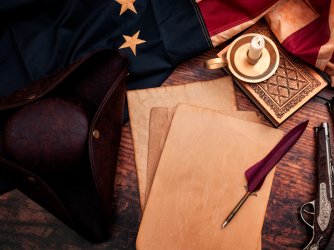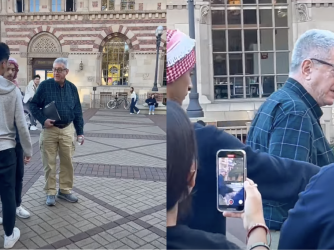Table of Contents
Music to our ears: California law restricts use of artistic expression as evidence in criminal trials

Sheila Fitzgerald Shutterstock.com
California Gov. Gavin Newsom (pictured) has signed into law a bill that would prohibit the use of rap lyrics as evidence in a trial.
In a major victory for artistic expression, last week California Gov. Gavin Newsom signed into law Assembly Bill 2799, known to supporters as “The Decriminalizing Artistic Expression Act.” Championed by criminal justice reform advocates and artist groups, the legislation restricts the use of lyrics and other forms of “creative expression” as evidence in California criminal proceedings.
The bill, which passed unanimously in both houses of the state legislature, requires California courts to carefully balance the value of the creative expression as evidence versus the potential undue prejudice that such expression could create:
In any criminal proceeding where a party seeks to admit as evidence a form of creative expression, the court, while balancing the probative value of that evidence against the substantial danger of undue prejudice . . . shall consider . . . in addition to the factors listed in [the California Evidence Code], that: (1) the probative value of such expression for its literal truth or as a truthful narrative is minimal unless that expression is created near in time to the charged crime or crimes, bears a sufficient level of similarity to the charged crime or crimes, or includes factual detail not otherwise publicly available; and (2) undue prejudice includes, but is not limited to, the possibility that the trier of fact will . . . treat the expression as evidence of the defendant’s propensity for violence or general criminal disposition as well as the possibility that the evidence will explicitly or implicitly inject racial bias into the proceedings.
Importantly, the bill requires a judge to hold a hearing weighing evidence outside the presence of the jury. As Assembly member Reginald Jones-Sawyer, author of the legislation, noted in the bill analysis, “Even in cases where creative expressions are not admitted as evidence, its discussion in front of a jury can poison the well by allowing for explicit or implicit [bias] against certain forms of creative expression to play a role in the case.”
Criminal justice research has long warned of the danger of racial bias being introduced into trials through rap lyrics. Just this week, a California judge overturned murder convictions of two defendants because their rap lyrics were introduced at their trial and likely injected racial bias into the proceedings. The judge’s ruling was based on a 2020 California law, the Racial Justice Act, which sought to combat racial bias in policing and prosecution.
While the media focus has been on limiting the use of rap lyrics in trials, the bill has a broad definition of “creative expression,” meaning that creators of many forms of artistic expression are protected.
We previously highlighted potential problems with the use of rap lyrics in criminal proceedings. In 2020, FIRE Executive Vice President Nico Perrino discussed this issue on FIRE’s “So to Speak” podcast with Professor Erik Nielson and Professor Andrea Dennis, authors of “Rap on Trial: Race, Lyrics, and Guilt in America.” Nielson noted that, typically, “police and prosecutors are using one particular form of art, and that’s rap music. And they’re using it as evidence of a whole host of crimes, all sorts of criminal activity.”
Nielson continued, “the chilling effect is undeniable. It is very difficult to imagine that if you are systematically prosecuting people for poetry – whether it’s good poetry, bad poetry, we can all disagree. But it’s poetry. If you’re doing that, when are these artists going to realize that it is not okay to make this poetry?”
Legislation like AB 2799 will ensure that artists feel free to express themselves without fear their creation can unjustly be used against them by prosecutors.
While the media focus has been on limiting the use of rap lyrics in trials, the bill has a broad definition of “creative expression,” meaning that creators of many forms of artistic expression are protected. Specifically, the bill states that:
“creative expression” means the expression or application of creativity or imagination in the production or arrangement of forms, sounds, words, movements, or symbols, including, but not limited to, music, dance, performance art, visual art, poetry, literature, film, and other such objects or media.
While California is the first state to enact this type of legislation into law, similar pieces of legislation have been considered throughout the country. A similar bill passed the New York State Senate in May. In Congress earlier this year, Rep. Hank Johnson introduced H.R. 8531, the “Restoring Artistic Protection Act of 2022” or the “RAP Act.” This bill bears many similarities to AB 2799 and is a good starting point for federal legislators to tackle this important issue. We encourage lawmakers on both sides of the aisle to work together and support these speech-protective pieces of legislation.
FIRE will continue to keep readers informed of additional legislative efforts on this important issue.
Recent Articles
FIRE’s award-winning Newsdesk covers the free speech news you need to stay informed.


FIRE Statement: X Corp's lawsuit and Texas's investigation into Media Matters for America are deeply misguided

Anonymous speech is as American as apple pie


